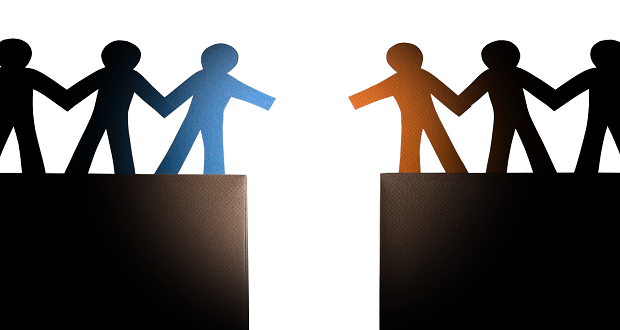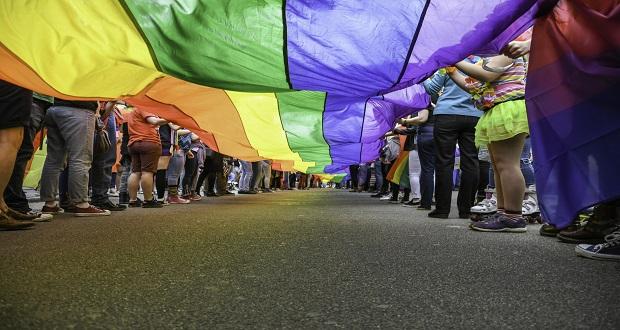
Several weeks ago, I stumbled across Tayari Jones’ essay “There’s Nothing Virtuous About Finding Common Ground,” published in TIME Magazine. The title immediately caught my attention for several reasons, not the least of which being that, at The Winters Group, we identify “establishing common ground” as an essential component of successful conversations across difference. I have also found in my personal interactions around equity and inclusion that arriving at a shared understanding of foundational ideas is necessary to push the conversation forward. In light of this, I was curious and initially skeptical about Jones’ critique.
Jones, who was raised by parents devoted to activism, learned early on about global injustices. In the essay, she recounts an early memory of choosing to stand up for her beliefs. During a trip to the zoo, her friend’s mother stopped for gas at a Gulf station. The young Jones knew that Gulf was heavily invested in South African apartheid. Assuming her friend’s mother would be alarmed to learn this information, she took it upon herself to inform the woman of Gulf’s investment and, by extension, culpability in acts of horrible violence in South Africa. Jones was taken aback to hear in response, “Gulf gas is about 60 cents a gallon,” as the unbothered woman continued to insert the nozzle into her car’s tank. A budding activist, Jones left the car and refused to move until her parents came to retrieve her.
Jones uses this story to illustrate her discomfort with Americans imploring one another to “meet in the middle” on the contentious issues that we find dividing us at a time of intense polarization. Jones acutely pinpoints the problem with this rhetoric: the “middle” of two sides of an argument does not somehow “[represent] a safe, neutral, and civilized space…This American fetishization of the moral middle is a misguided and dangerous cultural impulse,” Jones concludes.
She then asks, “…what is halfway between moral and immoral?” As an illustration, she facetiously queries whether we ought to have replaced slavery with indentured servitude, or Japanese-American internment during WWII with prison sentences for those innocent citizens. Needless to say, the answer to both is a resounding “no.”
While pure, objective ideas of “good” and “bad” may not exist anywhere in the naturally subjective human condition, I agree with Jones on this point. As countless activists and scholars alike have concluded, it is deeply dangerous to draw an equivalency between ideas and policies that seek to subjugate people, and those that seek to liberate them.
As countless activists and scholars alike have concluded, it is deeply dangerous to draw an equivalency between ideas and policies that seek to subjugate people, and those that seek to liberate them. Click To TweetIn essence, my initial skepticism to Jones’ message amounts to semantics; while these terms are often used interchangeably, it seems that it is less “common ground” and more “compromise” that Jones takes issue with in the context of current sociopolitical rhetoric. While operating without compromise is rarely a feasible tactic in politics, the fact remains that, in developing policy in response to moral violations, it may not be appropriate to “meet in the middle.”
Next, the question becomes: if we are not willing to compromise, how can we approach the moral side of the spectrum in our understanding of social issues and, more broadly, in our policies? This is where common ground enters the equation.
To agree upon what is moral, we must start by affirming the humanity of all parties involved. This may seem self-evident, and yet, it’s rarely a practice that is intentionally built into our daily lives. As Jones observes, “Many people understand politics as merely a matter of rhetoric and ideas. Some people will experience wars only in news snippets.” I am just as guilty as the next person of often casually scrolling through news sources, reading numbers of casualties as statistics rather than lives—because it’s emotionally easier (and in some ways, accurate) to conclude “this doesn’t affect me.”
In order to achieve empathy—a first step toward common moral understanding of a situation—we must be, in some way, able to put ourselves in someone else’s place. As Jones remarks in her essay, she identified with schoolchildren killed in South Africa—and by extension, was deeply emotionally invested in this injustice—by virtue of being a schoolchild valuing her own safety, and that of her peers. She notes that, despite her differences from those schoolchildren, “my empathy with them was complete.” At times, we may find empathy built into our understandings by virtue of our shared identity or experience with another person or group, as Jones found. But too often, (like the mother at the Gulf station), as a result of systems of oppression we all function within, and privileges we hold, we are initially unable to view someone else’s plight with empathy–because we are too far removed from it.
How do we move beyond this stumbling block? Where shared understanding is not built in naturally for us, we must find it. That requires starting with a shred of commonality, however small. “We all want safety for ourselves and our families,” is one place we often begin in our sessions when identifying common ground. Once we have established initial commonality that humanizes others, we have the potential to develop empathy, become more curious, and invest in learning about their experiences.
Once we have established initial commonality that humanizes others, we have the potential to develop empathy, become more curious, and invest in learning about their experiences. Click To TweetPracticing empathy requires the intention to do so and a continued commitment. Our identity-based privileges can create a buffer that makes it easy not to empathize with others (e.g. – reading the news and keeping emotional distance from the events). This means practicing empathy may at times require external prompting, or reminders to empathize with our cultural others. This is part of “the work,” and an important practice to strive for and remain committed to.
This is the “common ground” we begin with at The Winters Group. We begin here in order to move progressively toward shared meaning, and eventually, justice: toward that which is—to the extent that it can be—objectively moral.


















